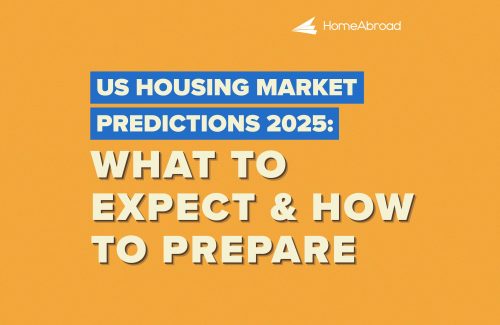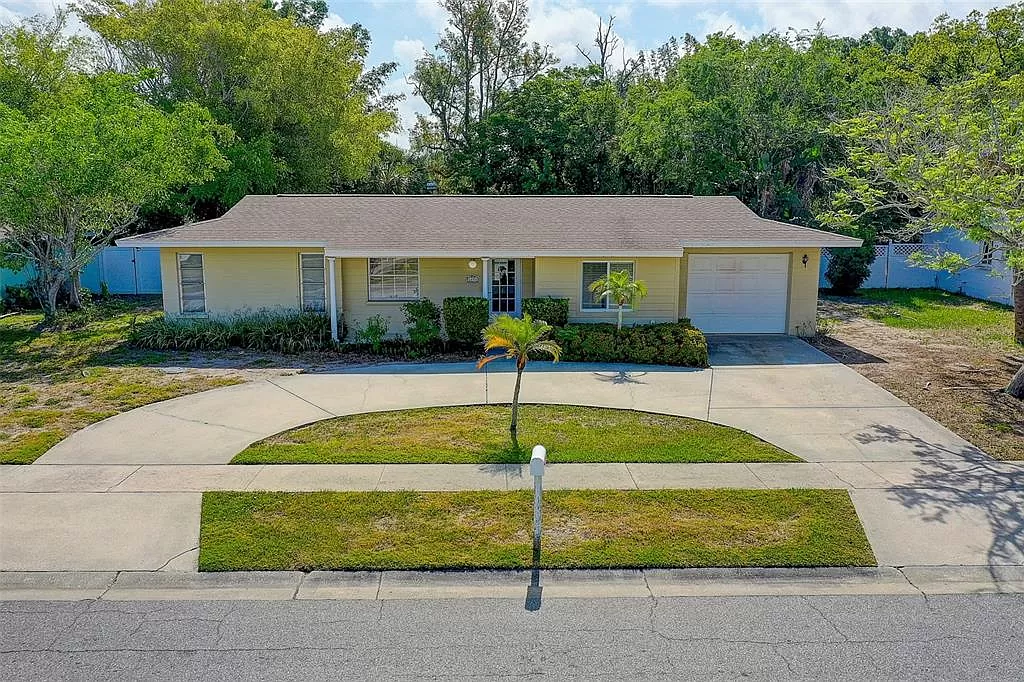Editorial Integrity
Making informed real estate decisions starts with having the right knowledge. At HomeAbroad, we offer US mortgage products for foreign nationals & investors and have a network of 500+ expert HomeAbroad real estate agents to provide the expertise you need. Our content is written by licensed mortgage experts and seasoned real estate agents who share insights from their experience, helping thousands like you. Our strict editorial process ensures you receive reliable and accurate information.
Key Takeaways:
➡️ Mortgage rates stabilizing around 6.4%–6.6% offers buyers clarity and affordability.
➡️ Inventory growth will give buyers more options and reduce competition.
➡️ Emerging markets, especially in affordable regions, present ideal opportunities for buyers and investors.
➡️ Technology-driven tools are reshaping real estate accessibility for domestic and foreign buyers.
As we look ahead to 2025, the US housing market is shaping up to be a turning point for buyers and investors alike.
Mortgage rates are finally stabilizing, inventory is growing, and home prices are rising at a manageable pace—offering opportunities we haven’t seen in years.
At HomeAbroad, we’ve seen firsthand how market shifts can open doors for buyers and investors ready to act. This year, economic growth, changing demographics, and emerging regional trends will define the housing market landscape.
Here’s everything you need to know to stay ahead in 2025 and secure your next move.
Table of Contents
Will Mortgage Rates Go Down in 2025?
Mortgage rates have been a dominant force in the housing market, hitting as high as 8.45% in 2023 and sidelining many buyers. Thankfully, 2025 brings signs of stability. Experts predict rates will settle around 6.4%–6.6%, creating opportunities for both buyers and refinancers.
What’s Driving Mortgage Rate Trends?
Several economic and policy factors will determine where mortgage rates land in 2025:
✅ Federal Reserve Policies
- As inflation continues to cool (currently at 2.7%), the Federal Reserve is expected to cut interest rates in 2025, easing borrowing costs.
- However, experts warn that rate cuts will be gradual and dependent on steady economic improvement.
✅ Economic Conditions
- A growing economy and robust job creation—projected to add 2 million jobs—will boost consumer confidence but may slow rate declines.
✅ Trump’s Tariff Policies
- Proposed tariffs under Trump’s administration could reignite inflation, counteracting the effects of Fed rate cuts and keeping mortgage rates relatively stable rather than significantly declining.
- On the flip side, his agenda to ease regulatory burdens on builders may offset some inflationary pressures by increasing housing supply, contributing to market stability.
Stability in mortgage rates opens doors for buyers who’ve been waiting for clarity. The key is to act while opportunities align with your financial goals.
– Steven Glick, Director of Mortgage Sales, HomeAbroad
At HomeAbroad, we help buyers and homeowners around fluctuating rates with tailored mortgage solutions—including loans for foreign nationals and investors—so you don’t miss your window of opportunity.
Will There Be More Homes on the Market in 2025?
Housing inventory has been a critical challenge for years, pushing prices up and limiting options for buyers. However, as we head into 2025, industry experts predict a gradual improvement, primarily fueled by new construction.
What Experts Are Saying
- NAR (National Association of Realtors) predicts an increase in both new and existing-home inventories, easing current supply constraints and giving buyers more flexibility.
- Zillow highlights a notable rise in inventory, empowering buyers with more options and greater negotiating power, especially in regions with strong new construction activity.
- Bankrate emphasizes a gradual improvement in housing supply, driven by builder confidence and economic stability.
Why Is Inventory Improving?
✅ New Construction Leads the Way
Builders are regaining confidence as mortgage rates stabilize around 6%, encouraging them to bring more projects to market. Additionally, the new administration’s focus on easing regulations for developers—such as simplifying zoning laws and reducing compliance hurdles—has accelerated housing starts in regions with affordable land and labor costs, like the Southwest and Midwest.
✅ Shifting Policy Dynamics
The government’s focus on addressing housing supply shortages has also led to increased funding for infrastructure projects and incentivized housing developments in underutilized urban and suburban areas. These initiatives are paving the way for higher inventory levels in 2025.
✅ The Lock-In Effect Persists
While new homes are on the rise, existing-home inventory remains tight. Experts at Bankrate predict existing-home supply will only improve modestly as mortgage rates stabilize near 6%, encouraging some movement.
At HomeAbroad, we help buyers secure financing for homes in these growing markets, ensuring you can act quickly as inventory improves and opportunities arise.
The administration’s emphasis on streamlining development regulations and increasing funding for affordable housing initiatives is reshaping inventory trends, particularly in underserved markets.
– Amresh Singh, CEO, HomeAbroad
The Role of Foreign Buyers in 2025
The 2025 housing market is expected to see a rise in activity from international buyers, driven by stabilized rates and an improving global economy.
What’s Attracting Foreign Buyers?
✅ Flexible Financing Options: Programs like HomeAbroad’s foreign national mortgages simplify the process for overseas investors.
✅ Prime Investment Cities: International buyers are focusing on major hubs with high-yield opportunities.
✅ Currency Dynamics: Favorable exchange rates make US real estate more accessible to foreign investors.
Global buyers see US real estate as a safe investment, especially with stabilized rates and flexible financing tools.
– Amresh Singh, CEO, HomeAbroad
Home Sales: Is a Recovery Finally on the Horizon?
After a challenging few years of low sales activity, 2025 is shaping up to be a year of gradual recovery for the housing market. Experts agree that improving mortgage rates and rising inventory will help reignite buyer interest and push sales upward.
What Experts Predict for Home Sales in 2025
✅ NAR Forecast: Lawrence Yun, Chief Economist at the National Association of Realtors (NAR), projects a 11% increase in existing-home sales for 2025. Yun cites improving affordability and pent-up buyer demand as major factors behind this growth.
✅ CoreLogic: Chief economist Selma Hepp from the real estate analytics firm anticipates total home sales will increase by 9% in 2025.
“With mortgage rates stabilizing and the worst of the inventory shortages behind us, 2025 is set to be a rebound year for the housing market. Home sales are projected to rise by 9%, driven by improving affordability and continued job additions to the economy.
– Lawrence Yun, Chief Economist, NAR
Spotlight on Luxury and Commercial Real Estate
While affordable housing remains the focus, the luxury and commercial real estate sectors present unique opportunities for investors:
✅ Luxury Homes: Stabilized rates are reinvigorating demand in high-end markets like Beverly Hills and Manhattan.
✅ Commercial Properties: Multi-family housing and office spaces in thriving economic hubs offer excellent investment potential.
How Trump’s Election Could Impact the Housing Market
With Donald Trump returning to the White House in 2025, his proposed economic policies are sparking significant discussion about their potential impact on the housing market.
From tariffs to tax cuts, Trump’s administration could shape mortgage rates, housing affordability, and new construction trends.
- Tariffs and Inflation: Proposed tariffs may increase inflation, raising construction costs and keeping mortgage rates elevated.
- Regulatory Relief: Easing regulations could boost builder confidence and speed up new housing projects, especially in affordable regions.
- Tax Cuts and Growth: While tax cuts may drive job creation and housing demand, they could also push mortgage rates higher due to deficit concerns.
For a deeper analysis of Trump’s policies and their impact on real estate, read our full breakdown here.
How Economic Trends Will Shape the Housing Market in 2025
The housing market doesn’t exist in isolation—it’s driven by key economic factors like job growth, inflation, and demographic trends. In 2025, these forces will play a major role in shaping both affordability and demand.
✅ Job Growth Fuels Housing Demand
The US economy is projected to add nearly 2 million new jobs in 2025, as per NAR. A stronger job market boosts household incomes, enabling more buyers—especially millennials and Gen Z—to enter the market.
This steady employment growth will be a key driver of:
- First-time Home Purchases: Young professionals will have more confidence to invest in their first homes.
- Relocation Activity: Job changes and career moves will increase demand in thriving economic hubs.
✅ Inflation and Federal Reserve Policies
While inflation has cooled to 2.7%, experts emphasize that lingering risks—like tariffs or supply chain disruptions—could push inflation higher.
If inflation remains under control, the Federal Reserve may continue easing monetary policy in 2025. However, experts caution that Fed rate cuts do not always translate directly into lower mortgage rates.
Mortgage rates are influenced by a variety of factors, including:
- Inflation Trends: Persistent inflation could offset rate cuts and keep borrowing costs elevated.
- Bond Market Dynamics: Mortgage rates often follow movements in 10-year Treasury yields, which respond to investor expectations for long-term inflation.
- Investor Sentiment: Economic or geopolitical uncertainties may drive volatility in mortgage rates, limiting significant declines.
While Fed rate cuts can ease some borrowing pressures, mortgage rates depend on broader economic factors like inflation and bond markets.
– Amresh Singh, CEO, HomeAbroad
✅ Demographics: Population Growth Drives Long-Term Demand
With the US population growing by over 70 million people since 1995, the demand for housing remains strong:
- Millennials (the largest demographic group) encompassing both younger (ages 25 to 33) and older (ages 34 to 43) cohorts, represent 38% of the homebuying market, marking a substantial increase from 28% in the previous year.
- Baby boomers, particularly those aged 58 to 76, constitute 31% of homebuyers, often seeking smaller homes, condominiums, or properties closer to family as they approach retirement.
These shifts are fueling housing activity in regions that offer affordable living and job opportunities, like parts of the Midwest and Southwest.
With mortgage rates stabilizing, inventory improving, and home prices rising at a manageable pace, 2025 presents significant opportunities for buyers and investors.
Final Thoughts: Is 2025 the Year to Act?
The 2025 housing market offers a unique blend of stabilized rates, growing inventory, and manageable price growth. Waiting for further rate declines may mean missing out on favorable conditions today.
By acting now, buyers and investors can secure financing, lock in rates, and make the most of emerging opportunities in regions with strong housing supply and job growth.
FAQs
1. Will mortgage rates go down in 2025?
Experts, including Fannie Mae and MBA, predict that mortgage rates will stabilize around 6.4%–6.6% by the end of 2025. While significant drops are unlikely, stabilizing rates will improve affordability for buyers and refinancers.
2. Will there be more homes for sale in 2025?
Yes, housing inventory is expected to improve gradually in 2025, driven by increased new construction and slight gains in existing home listings. Regions like the Southwest and Midwest will likely see the most supply growth.
3. What are the predictions for home prices in 2025?
Home prices are expected to grow by about 4% – 5% year-over-year.
4. How will Trump’s economic policies impact the housing market?
Trump’s proposed tariffs could push inflation higher, potentially slowing mortgage rate cuts. However, easing builder regulations may boost new construction, increasing housing supply in affordable regions.
5. Is 2025 a good year to buy a home or invest?
Yes, 2025 presents opportunities for buyers and investors as mortgage rates stabilize, inventory grows, and job creation strengthens demand. Regions with affordable housing and economic growth, like the Southwest, offer ideal investment potential.






















